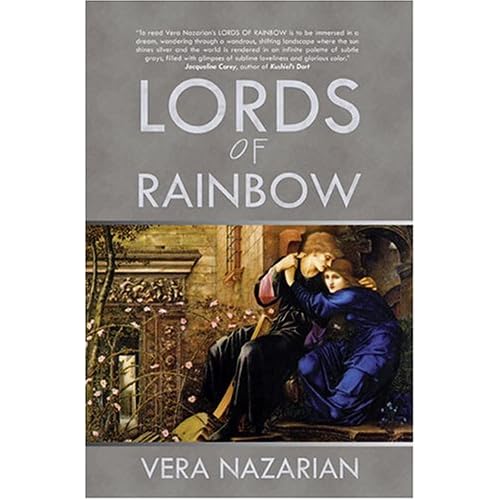 A decade ago, I was a big fan of secondary-world fantasies: big sprawling epics, an entirely different but familiar setting, and larger than life characters. Had I read Lords of Rainbow back then, I would have immediately fallen in love with it. As I am now, however, there's a lot less unabashed praise for that particular sub-genre and I've become more critical.
A decade ago, I was a big fan of secondary-world fantasies: big sprawling epics, an entirely different but familiar setting, and larger than life characters. Had I read Lords of Rainbow back then, I would have immediately fallen in love with it. As I am now, however, there's a lot less unabashed praise for that particular sub-genre and I've become more critical.What's obviously commendable with Vera Nazarian is that her cosmology isn't a random hodgepodge of ideas but rather a cohesion of a single, united vision. As can be gleaned from the title, the rainbow--or rather the colors of the rainbow--plays a consistent role all throughout the novel. Right from the very start, one gets a sense that the narrative has its own unique culture as Nazarian uses alien terms and expressions, references unfamiliar pantheons, and uses fanciful naming schemes.
For me however, this elaborate world-building is sometimes detracting. There's a couple of scenes where it's pure exposition as the author explains how the world works and has an unfortunate effect of halting whatever momentum it's achieved. For example, as we enter the second part of the novel, Nazarian vividly describes a city, mentioning its districts, its divisions (both social and geographical), and its social hierarchy. Suddenly, I'm reading Lords of Rainbow: The RPG Campaign Setting. It's not that I don't want exposition in my novels but does it have to be ten pages long? On the positive side, the author does create an imaginative world that's not merely a rehash of Tolkien. Whether such exposition is a welcome reading experience is best left for the reader to decide but personally, I was hooked more by the plot and the characters rather than this discourse on world building.
Thankfully, the book doesn't open with such dragging exposition. Lords of Rainbow excites and immediately hooks you, from the enigmatic narrator, the multi-faceted protagonists, and the fight scene in the first chapter that whets one's appetite. Once we get mid-way through the book, Nazarian captivates us with her compelling prose and her upbeat pace--a very distinct experience from my complaints above and transforms itself into a can't-put-down book. There's a really effective seduction scene for example, effective because it not only exuberates an air of sensuality while revealing little, but actually progresses the plot and fleshes out the characters rather than simply included to titillate.
Reading Lords of Rainbow rekindled my love for epic fantasy and Nazarian makes good use of its tropes, at the same time leaving room for surprise and revelation--certainly a welcome experience to a jaded reader like me who typically sees nothing but formula and cliche. Another praise-worthy element is that while this book is as epic as one can ever imagine, it's self contained and the author succeeds in this by focusing on the core characters of her story. Admittedly, if you're not a fan of epic fantasy, I hardly doubt if this book will change your mind.
Reading the first hundred pages, I was skeptical of the quality of the novel but once I got past that hurdle, Lords of Rainbow was very much a very fun and breathtaking read. If you're looking for some original epic fantasy without the baggage of a too-inflated cast or multi-volume investment, this is the book for you as it's probably best described as a microcosm of the said sub-genre.
No comments:
Post a Comment